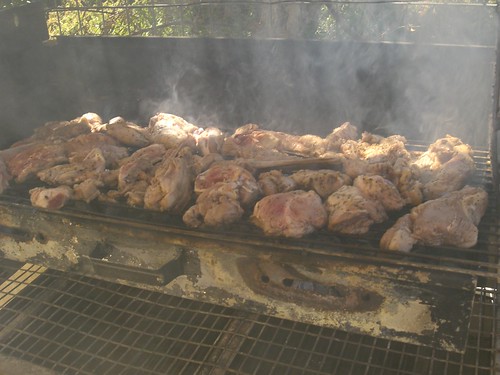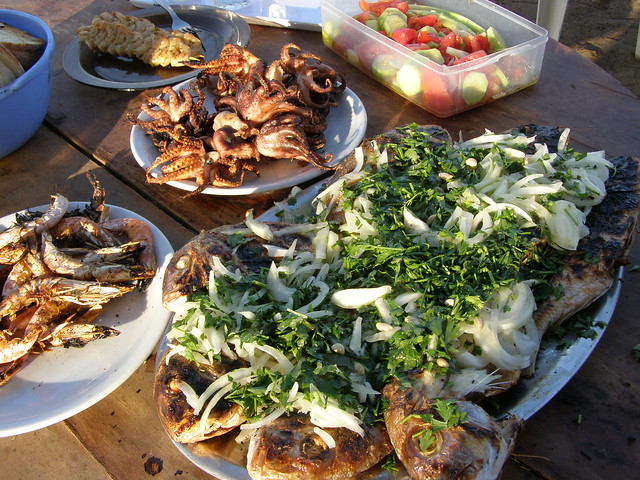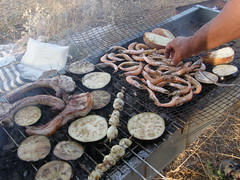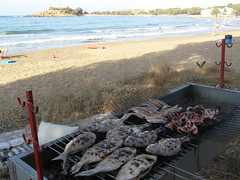
"It was a feast. Charred lamb chops and juicy fillet steak. There was a stew of eggplant and tomato, drizzled with lumps of creamy melted feta. There was black bean dahl and oven-baked spinach pilaf. There was coleslaw and a bowl of Greek salad with plump cherry tomatoes and thick slices of feta; a potato and coriander salad and a bowl of juicy king prawns. Hector had been completely unaware of the industry in the kitchen. His mother had brought pasticcio, Aisha had made a lamb in a thick cardamon-infused curry, and together they had prepared two roast chickens and lemon-scented potatoes. There was tzatziki and onion chutney; there was a pink fragrant taramosalata and a platter of grilled red capsicum, the skins delicately removed, swimming in olive oil and balsamic vinegar. the guests lined up for plates and cutlery and the children ate seated around the coffee table. There was hardly any conversation: everyone was too busy eating and drinking, occasionally stopping to praise his wife and his mother for the food."I wasn't sure what to expect from this book. It was my first Kindle e-book purchase, setting me back a mere 1.15 euro (the day after I made my purchase, the Kindle e-book tripled in price). Half the Amazon reviewers (via both .com and .co.uk) gave it just one or two stars. As I started reading it, I realised why most people didn't like it: they were probably reading it from a mono-cultural/Anglo point of view, and weren't taking into account the immigrant Greek perspective it was written from. Just because we all speak the same English language*, we don't all necessarily understand each other. It also occurred to me that most of those Amazon reviewers were probably reading The Slap because it had won a major literary award (the Commonwealth Writers' Prize, 2009), so they were expecting a certain genre of quality fiction, a bit like myself when I read The Gathering

Barbecue at my house refers only to the form of cooking, not the revelry that takes place surrounding the event. I can only imagine the scene at Hector's Melbourne barbecue: freshly mowed lawn, lounge chairs, baggy low-slung capri unisex pants, men wearing BBQ aprons cooking the meat, women uncovering the glad wrap from the salad bowls before taking a seat in the lounge chairs, toddlers running up to mommies wailing 'wanna go pottie', mommies replying 'you've got a daddy too, you know.'
What the readers got instead was the trail of racist slurs often felt among a melting-pot society, but never voiced. Tsiolkas opened his bag fat mouth: he hurt people's feelings, he upset the myth of societal balance in present-day multicultural Australia, and worst of all, he used all the negative Australian stereotypes (red-faced, pot-bellied, beer-swilling, straight from the stubbie) often ascribed to the typical Ozzie bloke to build the character of the father (Gary) whose unlikeable child (the stereotype of the Instant-Gratification Generation) was slapped - an illegal act that falls under the category of criminal law in Australia - by another (Greek) father:
"Gary was going to get drunk. Gary always got drunk. It had become a running joke in the family, one Aisha disapproved of because of her loyalty to [Rosie]. Gary and Rosie have been attending their family Christmases on and off for years, and every time, once they had walked out the door, Rosie usually trying to support her staggering husband, Hector's mother would turn to the other Greeks, raise her eyebrows and exclaim, Australezi, what do you expect? It's in their blood! "Gary (the convict-stock Australian) is the complete opposite of the angelic character of the mavraki (the blackie, as Hector's mother calls his Aborigine friend) Bilal (formerly Terry in his pre-Islam days), the person that Australian society would expect to get drunk and disorderly (anywhere). But Bilal gave up alcohol after a major religious experience:
"[Bilal] no longer lost himself in destructive rages, no longer hurt himself or dared death."I often use the term 'New World' in my own writing to denote the Western lifestyle, and was glad to come across it in The Slap
"As usual, Aisha was thorough and meticulous, listing the exact quantities of the ingredients she wanted. Twenty-five grams of green cardamon seeds (she never bought spices in bulk because she believed they became stale too quickly). Nine hundred grams of squid (Hector would ask for a kilo; he always rounded up, never down). Four eggplants (then in brackets and underlined, she had indicated European not Asian eggplants). Hector smiled as he read down the list. His wife's orderly habits sometimes made him frustrated, but he admired her efficiency and he respected her calm manner. If left to him, the barbecue would have been chaotic and resulting in panic."Hector's mother sounds as though she is straight out of the Old World. In fact, she reminds me of my own mother in some ways, whose greatest fear was inter-racial marriage:
"Aisha was a marvel at organisation... Aisha's steadiness and intelligence had a benign effect on him... Even his mother - who had initially bitterly resented his relationship with an Indian girl - admitted as much."Mine needn't have worried: all her children ended up marrying Cretans, hence none of her grandchildren (had she lived to meet them) would be the half-and-halfs she kept reminding us she would refuse to acknowledge. Most people reading this would think that my mother sounded like a racist Greek, making this point worthy of analysis. She wouldn't have worried so much about Hector being disloyal to his wife, or taking drugs; she would have been more concerned about the religious upbringing of her half-Indian half-Greek inglezakia grandchildren. My mother didn't have the chance to go through what Hector's mother experienced: the upheaval in the defining - both legal and conceptual - of identity in the New World was developing at the time of her death, after the down-under influx of Asian immigrants.
Source: Global Greek World
You may be wondering if Aisha's Indian parents should be thinking in the same kind of racist way as the Greek mother; since we don't hear them expressing their opinion so blatantly as the 'racist' Greek, maybe that shows how much more civilised they were in comparison to the Greeks? In fact, there was less worry from that direction - Aisha's mother was English, only her father was Indian, which means that Aisha had been raised 'Australian'. There are a number of times when Aisha loses patience with her husband and asks why he can't simply shake off his Greekness and think like an Australian: "He's so fucking Greek at times," she tells her childhood Jewish friend Anouk.
The best ever barbecue that I've attended is this one: God bless you, George.
Hector's Greek parents are stereotypically food-centric:
"'Why did you bring all this?' His father was holding a tray of chops and steaks. 'I bought all the meat we need at the market this morning. 'It's alright, Ectorra,' his mother answered in Greek, kissing him on both cheeks, two large bowls of salad in her hands. 'We're not barbarians or English to bring nothing to a barbecue. What we don't eat today, you and the children [notice that Hector's mother doesn't include his Indian wife] can have tomorrow.' Have tomorrow? They would be eating the leftovers till the following weekend. "Even though Aisha has been married to a Greek for a long time (their children are at primary school), she still can't get used to his parents' imminent fear of hunger:
"'There's more?' Aisha's voice was warm and cordial but Hector noticed the tightness around her mouth... 'There's going to be too much food,' Aisha whispered. Just leave it, he wanted to say, they have always been this way. They will always be this way. Why are you still surprised by it? 'It's alright,' he whispered back to her. 'What we don't eat today we can have for lunch through the week.'"While the novel is set in a Greek household and written by a Greek author, it is by no means tied to Greekdom. The Greek diaspora will be endeared to it in the same way that they could relate to most aspects of My Big Fat Greek Wedding (as opposed to the unsuccessful and degrading slapstick humour of My Life in Ruins/Driving Aphrodite), but Tsiolkas explores more aspects of immigrant life as a whole in Australia. The characters in the story are many and varied, representing a cross-section of racial, religious, age and sexual groups.
In this way, the Australian identity is the focus of this novel, which breaks the taboos of what can and cannot be said in public about what people are thinking. It is easier to do this as a writer, where you have more leeway in artisitic licence. But since The Slap is a successful novel that goes against all the rules of the New World's norms concerning race relations, then it provides proof that honesty is the best policy in coming to terms with our differences. Above all, it shows how important a sense of belonging is in a world where everything (except your paid-up, no-mortgage property) is purportedly open to belonging to everyone and a separate identity cannot be claimed in a multi-racial world. This was well illustrated by Anouk's contemplations of Shamira, the white Australian woman who had found Islam (and now wears a veil), her husband Bilal (the Aborigine who also turned to Islam to find his sense of belonging), and Rosie, the suburban Australian housewife who tries to play the victim and never admit to cruelty or malice within herself:
"... they [Anouk and Aisha] were both pitying and ridiculing the experiences of the three true authentic Australians. Aish and herself, they had real pasts, real histories. Jewish, Indian, migrant; it all meant something, they had no need to make things up, to assume disguises."I've whetted your appetite enough from the descriptions of the food presented in the book. Now go and find out what happens after the child ate wood from Hector's cousin's plate by reading the novel. I don't know what happens at the end, because I'm still only a third of the way through reading it myself. But it's the first time I couldn't wait to share a book I hadn't finished with other readers. NB: adultery, drug-taking and (not just Greek) racist slurs galore; you have been warned.
 UPDATE: Even though The Slap cost me just over 1 euro for my Kindle, I still ending up buying To Χαστούκι in paper copy for my husband who doesn't read in English - 22 effing euro and 50 friggin cents, from the bloody supermarket: now you know why Greeks don't read many good-quality fiction: they can't afford to.
UPDATE: Even though The Slap cost me just over 1 euro for my Kindle, I still ending up buying To Χαστούκι in paper copy for my husband who doesn't read in English - 22 effing euro and 50 friggin cents, from the bloody supermarket: now you know why Greeks don't read many good-quality fiction: they can't afford to. * I learnt a new English word after reading this novel: bogan. It only made it into the down-under dictionaries after I left NZ in 1991, which is why I missed out on its regular usage.
©All Rights Reserved/Organically cooked. No part of this blog may be reproduced and/or copied by any means without prior consent from Maria Verivaki.






I've read this book and many of Christos's other stuff...I loved your observations Maria!
ReplyDeleteMaria, I don't have time to read all of your post right now. I am "knackered" and have to go to bed. No, I am not British. I just like that term.
ReplyDeleteSo far I can see that I am going to enjoy, once again, your witty and articulate writing! Just out of stubbornness I clicked on bogan. I had never heard that word. I love words. I want to know everything. I will read all of your post tomorrow when I can see straight. Good night!